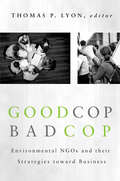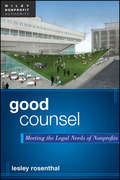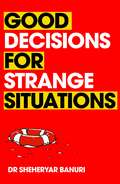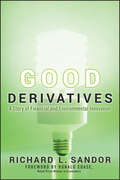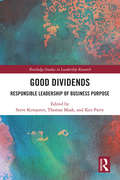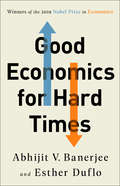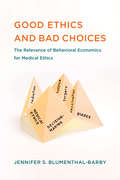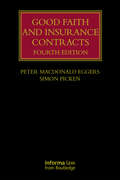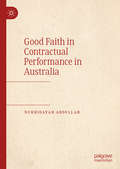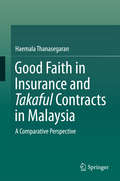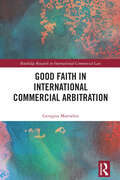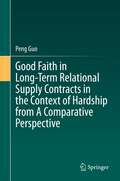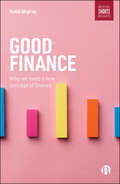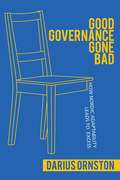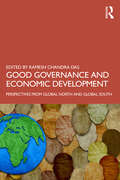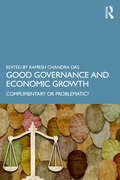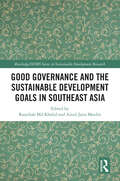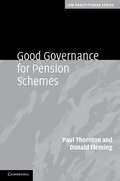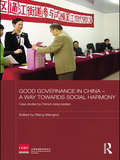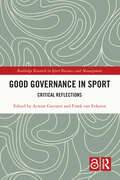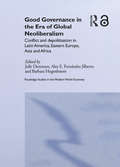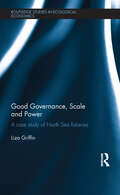- Table View
- List View
Good Cop/Bad Cop: Environmental NGOs and Their Strategies toward Business
by Thomas LyonNon-governmental organizations (NGOs) play an increasingly prominent role in addressing complex environmental issues such as climate change, persistent bio-accumulative pollutants, and the conservation of biodiversity. At the same time, the landscape in which they operate is changing rapidly. Markets, and direct engagement with industry, rather than traditional government regulation, are often the tools of choice for NGOs seeking to change corporate behavior today. Yet these new strategies are poorly understood-by business, academics, and NGOs themselves. How will NGOs choose which battles to fight, differentiate themselves from one another in order to attract membership and funding, and decide when to form alliances and when to work separately? In Good Cop/Bad Cop, Thomas P. Lyon brings together perspectives on environmental NGOs from leading social scientists, as well as leaders from within the NGO and corporate worlds, to assess the state of knowledge on the tactics and the effectiveness of environmental groups. Contributions from Greenpeace, Rainforest Action Network, the Environmental Defense Fund, and the World Wildlife Fund describe each organization?s structure and key objectives, and present case studies that illustrate how each organization makes a difference, especially with regard to its strategies toward corporate engagement. To provide additional perspective, high-level executives from BP and Ford share their views on what causes these relationships between companies and NGOs to either succeed or fail. For students of the social sciences and NGO practitioners, this book takes an important step in addressing an urgent need for objective study of NGO operations and their effectiveness.
Good Counsel
by Lesley RosenthalA concise overview of the legal needs of nonprofit organizationsGood Counsel is a compact and personable overview of the legal needs of nonprofits, crafted by one of America's most astute nonprofit general counsels. The book distills the legal needs of the 1.8 million tax-exempt organizations in the United States.Written in a clear and accessible style, with plenty of humor and storytelling as well as illustrative case studies, Good Counsel explains the basics of nonprofit corporate law, governance, and the tax exemption. It then takes a department-by-department look at legal topics relevant to program, fundraising, finance, communications, human resources, operations, contracts, government relations, and more. Good Counsel is designed help organizations fulfill their missions to do the public good.Designed to impart confidence and demystify the issues, Good Counsel is a must-read for nonprofit professionals and board members as well as lawyers and law students. Using Good Counsel as their playbook, lawyers, executives, and trustees can get an overview of the most common legal, governance, and compliance issues facing their organization and together ramp up a top-notch legal function. Contains practice pointers, checklists, and assessment toolsFeatures sample contracts, licenses, and other form documentsFilled with case studies and end-of-chapter focus questions, as well as available lesson plans for easy classroom use by educators in business, management, public policy, and law schoolsGood Counsel is the first-of-its-kind guidebook written by the sitting General Counsel of a major nonprofit. Written by influential author, speaker, and Bar leader Lesley Rosenthal, the General Counsel of Lincoln Center for the Performing Arts, Good Counsel shares the insights of a Harvard Law School graduate with years of in-house and business law experience as well as board service.
Good Decisions for Strange Situations: A guide to making the right choices in the Corona pandemic and beyond
by Dr Sheheryar BanuriGood decisions are hard to make - agreed? Whether it's deciding what kind of take-away to order, what brand of shampoo to buy, or what to do in a crisis, we've all been in situations where we panic or overthink.And now, more than ever, we are in unfamiliar territory. Our routines and norms have been completely disrupted, replaced by stress and anxiety and making a good decision is harder than ever.But this book is here to help. Behavioural Economist Dr Sheheryar Banuri will be your guide. By asking: What can we learn from past behaviour in similar crises? How does the psychology of decision-making change under stress? And how can we avoid making the wrong decisions? Good Decisions for Strange Situations is that fool-proof guide to help you give yourself the best possible chance of choosing wisely.
Good Decisions for Strange Situations: A guide to making the right choices in the Corona pandemic and beyond
by Sheheryar BanuriGood decisions are hard to make - agreed? Whether it's deciding what kind of take-away to order, what brand of shampoo to buy, or what to do in a crisis, we've all been in situations where we panic or overthink.And now, more than ever, we are in unfamiliar territory. Our routines and norms have been completely disrupted, replaced by stress and anxiety and making a good decision is harder than ever.But this book is here to help. Behavioural Economist Dr Sheheryar Banuri will be your guide. By asking: What can we learn from past behaviour in similar crises? How does the psychology of decision-making change under stress? And how can we avoid making the wrong decisions? Good Decisions for Strange Situations is that fool-proof guide to help you give yourself the best possible chance of choosing wisely.
Good Derivatives
by Richard SandorThrough the eyes of an inventor of new markets, Good Derivatives: A Story of Financial and Environmental Innovation tells the story of how financial innovation - a concept that is misunderstood and under attack - has been a positive force in the last four decades. If properly designed and regulated, these "good derivatives" can open vast possibilities to address a variety of global problems. Filled with provocative ideas, fascinating stories, and valuable lessons, it will provide both an insightful interpretation of the last forty years in capital and environmental markets and a vision of world finance for the next forty years. As a young economist at the Chicago Board of Trade, Richard Sandor helped create interest rate futures, a development that revolutionized worldwide finance. Later, he pioneered the use of emissions trading to reduce acid rain, one of the most successful environmental programs ever. He will provide unique insights into the process of creating these new financial products. Covering successes and failures, the story describes the tireless process of inventing, educating and creating support for these new inventions in places like Chicago, New York, London, Paris and how it is unfolding today in Mumbai, Shanghai and Beijing. The book will tell the story of the creation of the Chicago Climate Exchange and its affiliated exchanges (European Climate Exchange, Chicago Climate Futures Exchange and Tianjin Climate Exchange, located in China). The lessons learned in these markets can play a critical role in effectively addressing global climate change and other pressing environmental issues. The author argues that market-based trading systems are a far more effective means of reducing pollutants than "command-and-control". Environmental markets may ultimately help to find solutions to issues such as rainforest destruction, water problems and biodiversity threats. Written in an engaging, narrative style, Good Derivatives will be of interest to both practitioners and general readers who want to better understand the creative process of financial innovation. In the middle of so much distrust of markets, it is also a recipe of how transparent, well-regulated markets can be a force for good in the environmental, health, and social areas.
Good Dividends: Responsible Leadership of Business Purpose (Routledge Studies in Leadership Research)
by Ken Parry Thomas Maak Steve KempsterThis book seeks to answer the question of ‘leadership for what?’. We shall outline an answer by focusing on responsible leadership of purpose through an inter-disciplinary perspective. Responsible leadership moves the axis of leadership from leader-followers to leader-stakeholders; away from looking at leadership as person-centric – the qualities, abilities, and effectiveness of the leader, to a focus on the purposes, responsibilities and activities of leadership. Leadership orientation is about realising value for a range of constituencies, not just the shareholders of the business. In this way this book offers up an alternative business model to that of dominant neo-liberal approaches to capitalism and its flow-on effect to the leadership project. This is a model that draws on a most obvious assumption – if leaders maximise the use of all the capitals of their business they will maximise their dividends, and thus deliver their responsibility to the shareholders as well as other relevant stakeholders. This book explores how five dividends (based on five capitals) can be developed through attention to a sixth dividend (and sixth capital) – the dividend from our planet and communities. The planetary dividend is the flourishing of humanity – but it is also a significant dividend to the business. For example, by engaging the business in a purpose-led orientation to enhance the planetary dividend, the dividend from human resourcefulness becomes manifest – employee sense of purpose, commitment, passion and energy. The realisation of such can also connect with dividends from innovation, operations and brands. For example, the business benefits from a purpose-driven brand. In short, responsible leadership of purpose outlines a case for leadership to focus on a connected portfolio of ‘good’ dividends as an answer to the question ‘leadership for what?’ The book is written by academics and organisational leaders. It draws on a range of research with leaders from a variety of contexts to illustrate the challenges but also the benefits of this argument. It is an ambitious book: ambitious, in terms of moving leadership towards realising purpose; ambitious by seeking to align a range of business disciplines around responsible leadership; and ambitious because it challenges the dominant assumptions that shape business leadership. However, it is based on a simple question: why would a business not wish to generate good dividends for all its stakeholders?
Good Economics for Hard Times: Six Ways We Get The World Wrong And How To Set It Right
by Esther Duflo Abhijit V. BanerjeeThe winners of the Nobel Prize show how economics, when done right, can help us solve the thorniest social and political problems of our day.Figuring out how to deal with today's critical economic problems is perhaps the great challenge of our time. Much greater than space travel or perhaps even the next revolutionary medical breakthrough, what is at stake is the whole idea of the good life as we have known it.Immigration and inequality, globalization and technological disruption, slowing growth and accelerating climate change--these are sources of great anxiety across the world, from New Delhi and Dakar to Paris and Washington, DC. The resources to address these challenges are there--what we lack are ideas that will help us jump the wall of disagreement and distrust that divides us. If we succeed, history will remember our era with gratitude; if we fail, the potential losses are incalculable.In this revolutionary book, renowned MIT economists Abhijit V. Banerjee and Esther Duflo take on this challenge, building on cutting-edge research in economics explained with lucidity and grace. Original, provocative, and urgent, Good Economics for Hard Times makes a persuasive case for an intelligent interventionism and a society built on compassion and respect. It is an extraordinary achievement, one that shines a light to help us appreciate and understand our precariously balanced world.
Good Ethics and Bad Choices: The Relevance of Behavioral Economics for Medical Ethics (Basic Bioethics)
by Jennifer S. Blumenthal-BarbyAn analysis of how findings in behavioral economics challenge fundamental assumptions of medical ethics, integrating the latest research in both fields.Bioethicists have long argued for rational persuasion to help patients with medical decisions. But the findings of behavioral economics—popularized in Thaler and Sunstein&’s Nudge and other books—show that arguments depending on rational thinking are unlikely to be successful and even that the idea of purely rational persuasion may be a fiction. In Good Ethics and Bad Choices, Jennifer Blumenthal-Barby examines how behavioral economics challenges some of the most fundamental tenets of medical ethics. She not only integrates the latest research from both fields but also provides examples of how physicians apply concepts of behavioral economics in practice. Blumenthal-Barby analyzes ethical issues raised by &“nudging&” patient decision making and argues that the practice can improve patient decisions, prevent harm, and perhaps enhance autonomy. She then offers a more detailed ethical analysis of further questions that arise, including whether nudging amounts to manipulation, to what extent and at what point these techniques should be used, when and how their use would be wrong, and whether transparency about their use is required. She provides a snapshot of nudging &“in the weeds,&” reporting on practices she observed in clinical settings including psychiatry, pediatric critical care, and oncology. Warning that there is no &“single, simple account of the ethics of nudging,&” Blumenthal-Barby offers a qualified defense, arguing that a nudge can be justified in part by the extent to which it makes patients better off.
Good Faith and Insurance Contracts (Lloyd's Insurance Law Library)
by Peter MacDonald Eggers Simon PickenGood Faith and Insurance Contracts sets out an exhaustive analysis of the law concerning the duty of utmost good faith, as applied to insurance contracts. Now in its fourth edition, it has been updated to address the arrival of the Insurance Act 2015, as well as any references to new case law. In addition, it synthesises all known judicial decisions by the English Courts concerning good faith in this area. This book is still the only text devoted to a discussion of the duty of utmost good faith applicable to insurance contracts. As good faith is an issue which arises in respect of all insurance contracts, it is a book which will be extremely useful to lawyers involved in insurance as well as insurance practitioners.
Good Faith in Contractual Performance in Australia
by Nurhidayah AbdullahThis book gives a detailed account of the current state of the law concerning good faith in contractual performance in Australia, through an empirical study on its reception and development across the various Australian jurisdictions.In Australia, good faith received wide attention after Priestly J introduced in his obiter comments in Renard Construction (ME) v Minister for Works (1992) 26 NSWLR 234.This book focuses on the attitude of the judges to good faith, the definition of good faith, and the possibility of legislating a good faith obligation in Australian contract law. This book also discusses the issues surrounding its development, its meaning, and acceptance at the international level.The empirical legal research adopted in this book will offer a significant contribution in understanding the concept of good faith in Australia from the empirical perspective.
Good Faith in Insurance and Takaful Contracts in Malaysia
by Haemala ThanasegaranThis book examines good faith in non-marine insurance and takaful (Islamic insurance) contracts in Malaysia, and proposes holistic law reform of the same. The first two-thirds of the book comprise an extensive comparative legal analysis of the issues between Malaysia, Australia and the United Kingdom, with the final third dedicated to a socio-economic analysis of law reform and suggestions for law reform particularly suited to Malaysia. The book evaluates whether the duty of utmost good faith (the cornerstone of insurance and takaful contracts) is effectively regulated and, in turn, observed by insurers (and takaful operators) and insureds alike in Malaysia. The adequacy of the Insurance Act 1996 (Malaysia), the Takaful Act 1984 (Malaysia), the Financial Services Act 2013 (Malaysia) and the Islamic Financial Services Act 2013 (Malaysia) is evaluated, along with the supporting infrastructure and oversight measures introduced by the Malaysian government. In doing so, The book examines the duty of utmost good faith from both a doctrinal and a social science perspective, in order to propose suitable legal reform.
Good Faith in International Commercial Arbitration (Routledge Research in International Commercial Law)
by Georgios MartsekisThis book demystifies the effectiveness of good faith in international commercial arbitration law.In the growing universe of international commercial arbitration, it is more pressing than ever to discuss the role of good faith and challenge residual conservative skepticism regarding its usefulness. The book employs principles, standards and concepts which are normatively ingrained in good faith. These include the principle of pacta sunt servanda, the estoppel doctrine, the transnational standard of cooperation and fair dealing among merchants. It also discusses the pertinence of good faith to corrective justice, proportionality, prohibition of discrimination and unconscionability, international public policy and due process, among other concepts. This granular approach demonstrates how good faith is integrated into the practice of international commercial arbitration. The book sheds light on the technical functions of the principle in parties’ substantive protection, contractual interpretation and arbitral procedure, with an ultimate view to reinforcing the soundness and persuasive value of arbitral decision-making. Throughout, the book establishes a uniform and enforceable conceptualization of good faith in transnational disputes.The book will be of interest to practitioners and researchers in the fields of commercial law, arbitration, transnational disputes and international law.
Good Faith in Long-Term Relational Supply Contracts in the Context of Hardship from A Comparative Perspective
by Peng GuoThis book provides fair and acceptable solutions to hardship issues in long-term relational supply contracts. This book uses an approach to strike a balance between the traditional approach underlying classical contract law which emphasises the almost absolute prevalence of the principle of pacta sunt servanda and a flexible approach that is based on the principle of clausula rebus sic stantibus. This book argues for an emerging principle of pacta sunt servanda bona fide on the basis of the relational contract theory. Additionally, this book demonstrates how good faith can serve as a foundation for imposing a duty to renegotiate on the parties. The aim of this book is rather to propose how relational contract theory can be applied to the analysis of specific legal rules in general. Lastly, this boos highlights how the duty to renegotiate and the power to adapt a contract can be further developed upon the occurrence of hardship, based on good faith and the relational nature and characteristics of a long-term relational supply contract. This book explores and enriches the existing research on relational contract theory concentrates primarily on its application in domestic contract laws, particularly in the regulation of long-term contracts in American contract law. As an outcome this book provides a more feasible and satisfactory approach for courts or arbitral tribunals to undertake when facing hardship issues in international contract disputes. Overall, hardship themes, long-term relational supply contracts and good faith are examined extensively.
Good Finance: Why We Need a New Concept of Finance
by Vedat AkgirayJust as we need good food for good health, so too do we need ‘good finance’ for social and economic wellness. In this book, Vedat Akgiray presents a timely critique of extreme financialisation, of the economics profession’s flawed modelling approach and the continuing blind faith in the efficient market hypothesis. Outlining the causes of financial crises and their socioeconomic effects, Good Finance puts the issues into perspective. It offers a clear platform upon which our current concept of finance can be revised for the good of society.
Good Food, Great Business: How to Take Your Artisan Food Idea from Concept to Marketplace
by Susie WyshakBusiness wisdom from more than seventy-five food industry experts, specialty food buyers, and entrepreneurs to help you start and run a small culinary concern. For those ready to follow their foodie dreams (or at least start thinking about it) Good Food, Great Business is the place to get organized and decide whether creating a specialty food business is really possible. Whether the goal is selling a single product online or developing a line of gourmet foods to be sold in grocery chains, this working handbook helps readers become food entrepreneurs—from concept to production to sales to marketing. Using real life examples from more than seventy-five individuals and businesses that have already joined the ranks of successful enterprises, the book walks readers through the good, the bad, and the ugly of starting a food business.In these pages, you’ll learn . . . Personal habits and business fundamentals that will help you in every walk of lifeHow to choose the business idea or ideas that best fit you and your personalityHow to determine the viability of those ideasConcrete steps you need to take to make your business a reality
Good Governance Gone Bad: How Nordic Adaptability Leads to Excess (Cornell Studies in Political Economy)
by Darius OrnstonIf we believe that the small, open economies of Nordic Europe are paragons of good governance, why are they so prone to economic crisis? In Good Governance Gone Bad, Darius Ornston provides evidence that adapting flexibly to rapid, technological change and shifting patterns of economic competition may be a great virtue, but it does not prevent countries from making strikingly poor policy choices and suffering devastating results. Home to three of the "big five" financial crises in the twentieth century, Nordic Europe in the new millennium has witnessed a housing bubble in Denmark, the collapse of the Finnish ICT industry, and the Icelandic financial crisis.Ornston argues that the reason for these two seemingly contradictory phenomena is one and the same. The dense, cohesive relationships that enable these countries to respond to crisis with radical reform render them vulnerable to policy overshooting and overinvestment. Good Governance Gone Bad tests this argument by examining the rise and decline of heavy industry in postwar Sweden, the emergence and disruption of the Finnish ICT industry, and Iceland’s impressive but short-lived reign as a financial powerhouse as well as ten similar and contrasting cases across Europe and North America. Ornston demonstrates how small and large states alike can learn from the Nordic experience, providing a valuable corrective to uncritical praise for the "Nordic model."
Good Governance and Economic Development: Perspectives from Global North and Global South
by Ramesh Chandra DasGood governance is a prerequisite to development, improving the quality of life, and health and ensuring equity. This book examines the interdependency of good governance and economic development by exploring perspectives from the Global North and the Global South.It assesses the impact of good governance on economic development of countries such as the USA, India, Nigeria, Turkey, Pakistan, Bangladesh, Nepal and others, and on groups of developing nations like BRICS or ASEAN. The book investigates the interrelationships between development indicators like education, health, gender equity, resource distribution, environmental preservation, quality of life, livelihood and others with governance and provides empirical verifications of the impact of good governance upon development. Further, it offers insights into the economic and governance challenges that developing countries face and highlights strategies for governance that have proved effective in bolstering sustainable growth.This volume will be of interest to students and researchers of economics, political science, social science, international relations, public administration and sociology.
Good Governance and Economic Growth: Complimentary or Problematic?
by Ramesh Chandra DasGovernance has been incorporated into the development models of many countries because of its role in ameliorating inequalities in society. This book explores whether good governance boosts or hinders economic growth with perspectives from countries like India, the USA, Nigeria, Turkey, Pakistan, Bangladesh, Nepal, and others, and on groups of developing nations like BRICS and ASEAN.Governance has twin roles within economic systems. The first is where it guides administrators and the second is the normative role where it may act as a stimulus to economic growth and development. With the help of empirical investigations, this book analyses the interrelationships between good governance and inclusive and sustainable economic growth, productive employment, political stability, and decent work for all. It assesses the impact of various governance indicators and policy strategies on the economy and the GDP of countries in the Global North and South. The book also focuses on roadblocks to good governance such as violent conflicts, corruption, international threats and crises and its implication on economic growth. This volume will be of interest to students and researchers of economics, political science, social science, international relations, public administration, and sociology.
Good Governance and the Sustainable Development Goals in Southeast Asia (Routledge/ISDRS Series in Sustainable Development Research)
by Rasyikah Md Khalid and Ainul Jaria MaidinThis book discusses management and governance initiatives undertaken by agencies and stakeholders towards achieving the Sustainable Development Goals (SDGS) in the Southeast Asian region, specifically Malaysia, Indonesia, Thailand and Singapore. It highlights the theories, methodologies and action plans involved in implementing the goals in these countries and the importance of developing a positive relationship between the public and government agencies. With contributors coming from a range of disciplines and backgrounds across the Association of Southeast Asian Nations (ASEAN) region, this edited collection provides a holistic quantitative and qualitative approach to achieving the SDGs. In order to realise these development objectives, it argues that a strong understanding of the basic principles of governance across all levels is required, supported by effective citizen participation and conflict resolution. It provides a detailed overview of the importance of governance at the country level, addressing the key elements of an integrated framework to support sustainable transitions. Regional case studies highlight processes and recommendations for improving governance and risk management and elevating citizen awareness and participation. Good Governance and the Sustainable Development Goals in Southeast Asia is a comprehensive and valuable companion for researchers, government agencies, and professionals with an interest in the SDGs in Southeast Asia and beyond.
Good Governance for Pension Schemes
by Paul Thornton Donald FlemingRegulatory and market developments have transformed the way in which UK private sector pension schemes operate. This has increased demands on trustees and advisors and the trusteeship governance model must evolve in order to remain fit for purpose. This volume brings together leading practitioners to provide an overview of what today constitutes good governance for pension schemes, from both a legal and a practical perspective. It provides the reader with an appreciation of the distinctive characteristics of UK occupational pension schemes, how they sit within the capital markets and their social and fiduciary responsibilities. Providing a holistic analysis of pension risk, both from the trustee and the corporate perspective, the essays cover the crucial role of the employer covenant, financing and investment risk, developments in longevity risk hedging and insurance de-risking, and best practice scheme administration.
Good Governance in China - A Way Towards Social Harmony: Case Studies by China’s Rising Leaders (Routledge Studies on the Chinese Economy)
by Wang MengkuiGood governance is necessary for effective public administration and delivery of public goods and services. This is an important issue for all countries, but in particular for rapidly developing countries such as China where reform of governance and public administration is a key element of the public policy agenda. This book explores the key issues in governance and public administration facing China’s policy-makers today. Edited by Wang Mengkui, the former President of the Development Research Center of the State Council, and Chairman of the China Development Research Foundation - one of China’s leading think-tanks - it contains 36 papers selected from nearly 300 case studies presented by participants in the China’s Leaders in Development Executive Program. The authors are outstanding and experienced officials, and together represent the voice of China's new rising generation of leaders, policy-makers and officials. The cases are based on first-hand information and experiences either from the officials’ personal involvement, or their own in-depth investigations. The chapters cover a wide range of issue areas, such as institutional reform, urban construction, social governance, crisis management, resource and ecological environmental management, education and public health, and economic reform and development. Taken together, it provides an invaluable resource for anyone seeking to understand China’s own thinking on its governance and public administration.
Good Governance in Sport: Critical Reflections (Routledge Research in Sport Business and Management)
by Arnout GeeraertThis book fills an important gap in the sport governance literature by engaging in critical reflection on the concept of ‘good governance’. It examines the theoretical perspectives that lead to different conceptualisations of governance and, therefore, to different standards for institutional quality. It explores the different practical strategies that have been employed to achieve the implementation of good governance principles. The first part of the book aims to shed light on the complexity and nuances of good governance by examining theoretical perspectives including leadership, value, feminism, culture and systems. The second part of the book has a practical focus, concentrating on reform strategies, from compliance policies and codes of ethics to external reporting and integrity systems. Together, these studies shed important new light on how we define and understand governance, and on the limits and capabilities of different methods for inducing good governance. With higher ethical standards demanded in sport business and management than ever before, this book is important reading for all advanced students and researchers with an interest in sport governance and sport policy, and for all sport industry professionals looking to improve their professional practice.
Good Governance in Sport: Critical Reflections (Routledge Research in Sport Business and Management)
by Arnout Geeraert Frank Van EekerenThis book fills an important gap in the sport governance literature by engaging in critical reflection on the concept of ‘good governance’. It examines the theoretical perspectives that lead to different conceptualisations of governance and, therefore, to different standards for institutional quality.It explores the different practical strategies that have been employed to achieve the implementation of good governance principles. The first part of the book aims to shed light on the complexity and nuances of good governance by examining theoretical perspectives including leadership, value, feminism, culture and systems. The second part of the book has a practical focus, concentrating on reform strategies, from compliance policies and codes of ethics to external reporting and integrity systems. Together, these studies shed important new light on how we define and understand governance, and on the limits and capabilities of different methods for inducing good governance.With higher ethical standards demanded in sport business and management than ever before, this book is important reading for all advanced students and researchers with an interest in sport governance and sport policy, and for all sport industry professionals looking to improve their professional practice.The Open Access version of this book, available at www.taylorfrancis.com, has been made available under a Creative Commons Attribution-Non Commercial-No Derivatives 4.0 license.
Good Governance in the Era of Global Neoliberalism: Conflict and Depolitization in Latin America, Eastern Europe, Asia and Africa (Routledge Studies in the Modern World Economy)
by Barbara Hogenboom Jolle Demmers Alex E. Fernāndez JilbertoThis new collection critically examines the new global policy of 'good governance'. This catchphrase of aid policy and development thinking has been the subject of too little analysis to date. This book redresses the balance. It places the prefix 'good', and exactly what that means, under the microscope and examines the impact of neoliberal governance in a wide range of countries and territories, including Chile, Russia, Argentina and Indonesia.
Good Governance, Scale and Power: A Case Study of North Sea Fisheries (Routledge Studies in Ecological Economics #29)
by Liza GriffinIn recent years there have been several alarming predictions about the future of the planet’s fish stocks. As a result, many national governments and supranational institutions, including the European Union, have instituted reforms designed to mitigate the crisis. This book examines the discourse and practice of ‘good governance’ in the context of fisheries management. It starts by examining the ‘crisis’ of fisheries in the North Sea, caused primarily by overfishing and failure of the European Union’s Common Fisheries Policy. It then goes on to analyse reforms to this policy enacted and planned between 2002 and 2013, and the proposition that collapse of fish stocks could occur as a result of deficiencies in new governing arrangements, i.e. failure to apply ‘principles of good governance’. The book argues that impediments to good governance practice in fisheries are not merely the result of implementation deficits, but that they constitute a more systematic failure. Governance theory addresses issues of power, but it does not recognise the many important spatially contingent and relational forms of power that are exercised in actual governing practice. For example, it frequently overlooks spatial practices and strategies, such as ‘scale jumping, ‘rescaling’ and the discursive redrawing of governing boundaries. This book exposes some of these spatial power relationships, showing that the presence of such relationships has implications for accountability and effective policymaking. In sum, this book explores some of the ways in which we might better understand governance practice using theories of scale and relational concepts of power, and in the process it offers a critique and rethinking of governance theory. These reflections are made on the basis of an in-depth case study of the attempted pursuit of ‘good governance’ in the European Union via institutional reforms, focusing particularly on the thorny and fascinating case of North Sea fisheries management.
